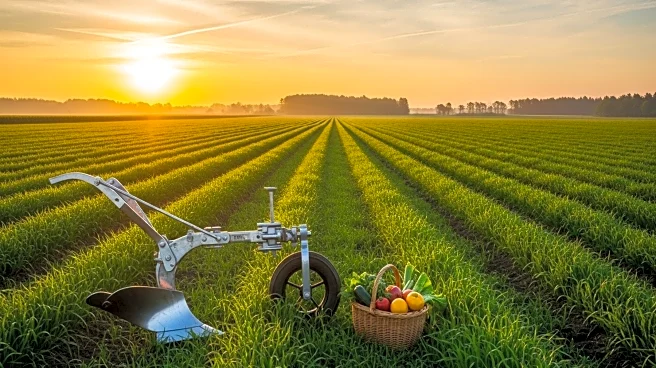What's Happening?
The Agriculture and Animal Husbandry Minister, Chandra Kumar, announced a new scientific approach to strengthen agriculture in the state. The initiative includes the Agriculture Road Map and Rabi Action Plan, aimed at providing farmers with a profitable farming direction. This announcement was made during a regional workshop at the Indian Potato Research Institute under the Vikasit Krishi Sankalp Abhiyan. The roadmap focuses on leveraging agro-climatic diversity and minimizing pesticide use to protect the environment and human health. The plan also emphasizes the importance of natural farming and coordination with national campaigns. The workshop aims to gather institutional perspectives from various agricultural bodies to prepare a five-year agricultural roadmap for Himachal Pradesh.
Why It's Important?
The new agricultural roadmap is significant as it aims to enhance the profitability and sustainability of farming in the state. By promoting natural farming and reducing pesticide use, the initiative seeks to protect both the environment and human health. This approach could lead to increased agricultural productivity and economic benefits for farmers. The focus on agro-climatic diversity and modern technologies like remote sensing could improve farming practices and yield better results. The initiative also includes a historic increase in milk prices and the establishment of a modern milk processing plant, which could further strengthen the agricultural economy.
What's Next?
The state government plans to implement the agricultural roadmap over the next five years, with effective strategies to be developed in collaboration with State Agricultural Universities, Government Departments, and ICAR Institutes. Training programs for officers in modern technologies are underway to connect the agriculture sector with advanced practices. The setup of a modern milk processing plant is expected to be completed soon, providing additional economic support to farmers.
Beyond the Headlines
The initiative could lead to long-term shifts in agricultural practices, promoting sustainable farming and reducing environmental impact. The emphasis on natural farming aligns with global trends towards eco-friendly agriculture, potentially setting a precedent for other regions. The integration of modern technologies could revolutionize traditional farming methods, enhancing efficiency and productivity.









